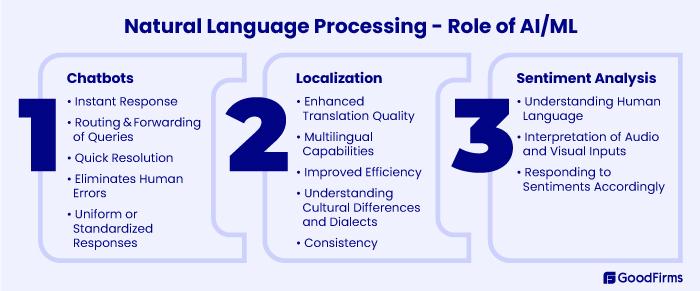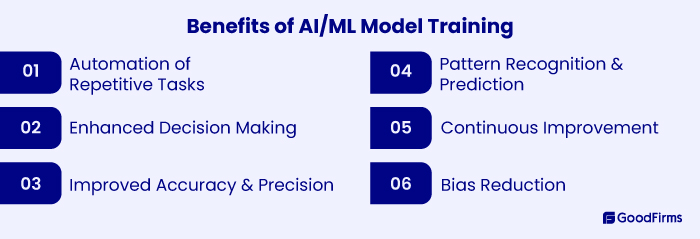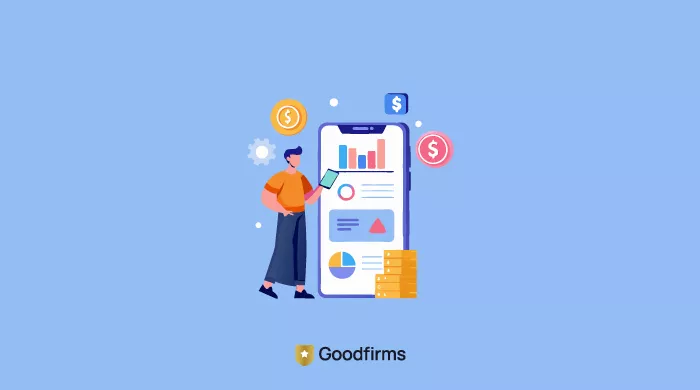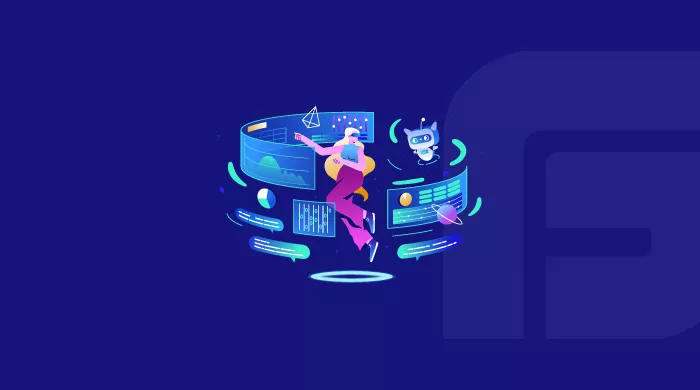Artificial Intelligence and Machine Learning are no longer just trends in mobile app development; they will define the future of Android, iPhone, and hybrid app development! The advanced capabilities that these technologies add to the applications make them engaging and highly productive. Integrating such intelligent capabilities into applications also empowers developers to create personalized, efficient, and complex-functional apps. So, despite the core differences in these platforms, mobile app developers are increasingly adopting AI and ML app development across platforms, including Android, iOS, hybrid, and BlackBerry.
Just because so many app developers are integrating AI/ML into their applications, should you be doing the same? This is one dilemma most businesses face. However, the decision is clear if you understand how AI and ML are influencing the mobile app development industry. The applications of AI/ML in mobile app development listed here will convince you why these technologies are not only desirable but inevitable in modern-day app development.
AI and ML in Mobile App Development - Applications
Most businesses are talking about Artificial Intelligence and Machine Learning! Almost all are adopting and integrating AI/ML functionalities in their applications. However, unless you know what AI actually adds to your app, you should not try using it. Here are the crucial applications of AI/ML in mobile applications.
Personalization
Machine learning algorithms analyze user interactions, behavior, preferences, and patterns to deliver tailored recommendations and experiences. Let’s see how different industries are leveraging ML/AI for personalization.
E-commerce: AI and ML track and analyze user behavior and patterns to identify prospective choices and preferences. Based on this, they develop personalized recommendations for supplementary products, complementary products, and best-match substitutes. It helps the user save time, while the e-commerce business can considerably increase sales.
Media Streaming: AI and ML study the viewership patterns of the user and suggest matching content on streaming applications to keep the user engaged. It can further help segregate recommendations based on age, gender, ethnicity, and other factors influencing the choice of content viewed.
Social Media: Voluminous content on different social media channels makes it difficult and time-consuming for users to find content specific to their interests. Irrelevant content can disengage the users and even compel them to abandon the application. AI/ML algorithms in social media platforms give personalized recommendations of content, content pages, and channels where the user can find material relevant to their preferences. This helps businesses reach their target audience easily and quickly.
Intelligent Search
AI empowers apps with intelligent search capabilities to understand natural language queries, context, or visual inputs. Based on this understanding, the app can deliver more accurate and relevant results, saving users time and making search queries efficient. For example, image search with Google Lens identifies products, objects, locations, and scenes in photos. Similarly, virtual assistants understand speech patterns and spoken commands. Furthermore, semantic search involves understanding the intent behind the search terms and not just keywords.
Predictive Analytics
Machine learning models forecast user behavior and can also predict outcomes to anticipate future needs, making the app more appealing and useful for the user. For example, using ML, maintenance applications can track equipment health and predict the possibility of failures, helping the maintenance teams to take appropriate measures to prevent disasters or system halts. Similarly, health tracker applications for wearables can alert users to any changing patterns or values of their vitals so that they can reach out for medical help.
Natural Language Processing
Natural language processing is one of the most talked-about applications of ML/AI in mobile apps. It empowers apps to effectively and quickly process human language, making human interactions natural and intuitive. For example, most businesses need chatbots that instantly respond to user queries, either solving the problem quickly or forwarding it to the relevant support team, if required.
NLP-powered apps are becoming increasingly powerful as they eliminate human errors and can process user queries quickly. They can also offer more uniform replies to commonly occurring problems without pushing the customer to an indefinite wait period or prolonged trial-and-error.
ML and AI through NLP are also making regional localization easy in applications by offering high-quality, real-time language translation. The app can also do sentiment analysis and respond to the customer accordingly. For example, an angry customer seeking support can be diverted to high-rated customer-care agents who can handle them properly and more effectively when the app can perceive emotions.

Image and Video Analysis
AI algorithms analyze visual data in apps to offer various functionalities, including face recognition. It can further be extended to augmented reality functionality to identify real-world objects and overlay digital information onto them.
Detection of Anomaly
Machine learning models have the capability to identify unusual patterns in data, which can be used to detect security breaches, errors, or even fraud. For example, unusual spending patterns are analyzed to detect fraudulent transactions. Similarly, identifying malfunctioning sensors or unexpected device behavior can incite proactive actions and prevent failures. Also, in security applications, it can be used to detect anomalies in video feeds.
Automation
AI and ML can be used to understand standard operative procedures, design best practices, and optimize the processes to improve efficiency. It can further design automation of these processes to avoid repetition and human errors. It can also change cumbersome manual and heavily human-intensive processes to simpler forms involving automatic systems, preventing huge expenses on hiring and retention of human resources.
Automation in businesses can start with basics such as email filtering automation and go beyond to simplifying bulk tasks such as extracting information from documents or images. Large businesses or factory setups can further leverage AI/ML-based automation to manage complete assembly lines, inventories, or even shop floors.
Considerations and Challenges in the Integration of AI and ML into Mobile Apps
Each mobile app development platform is unique in its own way. For example, Android differs from hybrid or iOS, even considering the technology stack involved. We can also say that technology growth has been so rapid that each platform has enough tools and resources for AI and ML integration. However, there are challenges and considerations too. Let us look into the development considerations for AI/ML integration, irrespective of the platform.
Lack of Trained Professionals
To cater to all types of users on different platforms, businesses must look for app development companies that can equally manage Android app development, iOS app development, and, if required, Hybrid app development. AI and ML are the most emerging technologies in the mobile app development industry, and the best app development companies strive to master all platforms. This is particularly a concern because it is not easy to find a developer equally proficient as an Android app developer and a BlackBerry application developer, considering the differences in tools, technologies, and frameworks.
In addition to that, rapid technological changes make developers outdated very quickly, unless they keep learning new aspects related to these technologies. Learning new skills takes time and effort. And if they take a lot of time, the skills go outdated again, as there are rapid technological changes. So, it is very difficult for businesses to find such expert and experienced developers who are skilled at all the relevant tools, can choose the best technology for AI/ML integration, and can also keep themselves updated with all the latest tools and technologies.
Data Security and Privacy
The effectiveness of AI and ML-based mobile applications is considerably dependent on the data used by the model, both quantitatively and qualitatively. This also means that the collection, storage, and usage of this data pose challenges related to security and user privacy. Whether you are an Android app developer or an iPhone application development company, you will need to address such privacy and security issues.
Many countries have framed guidelines and regulations related to the use of user data. It is mandatory for applications to include compliance with these regulations if the application is catering to users in these countries. For example, all of us know about GDPR and CCPA. Since the issues have been known for a long time, developers are considering options such as on-device ML to mitigate privacy challenges, as this means the data can be stored locally. But this does give rise to further concerns and challenges.
Model Size and Performance
While we discuss on-device functionalities, it becomes essential to understand the problems and challenges associated with them. Mobile devices are limited in resources, including CPU, GPU, RAM, and storage. Offering high-quality ML/AI on-device functionality means that you are assuming that all your users are willing to spend heavily on high-configuration phones. This assumption is damaging, as a vast number of users manage with average configuration phones, and applications working on only high-end devices could lose a big user base. There has to be a solution that balances the need with the quality and offering.
Developers are working hard to optimize the model size and computational complexities for efficient on-device processing without loss of app performance. Advanced techniques like model quantization and pruning are steps forward in the right direction.
On-Device and Cloud-Based ML
Cloud models differ from on-device models in terms of latency, privacy, connectivity, and computational power. Selecting the model requires a thorough analysis of requirements to trade off on these terms. As discussed already, AI/ML models require very heavy processing and computational capabilities, ideally offered by cloud models. However, to develop applications for the majority of users who can’t use very costly or high-configuration devices, some of these functionalities have to be extended for on-device processing. Developers are increasingly trying to find techniques and technological solutions to address such issues.
Model Training
ML models improve with continuous training. Training requires a regular supply of high-quality and relevant data, along with computational resources. Developers must develop systems for training, evaluating, and deploying models to mobile applications.
Most cloud platforms offer tools and resources that make it possible for developers to manage the models. There are costs associated with training ML models, and depending on the purpose that the model is serving in the app, the costs can go very high. ML/AI model training is itself a skill, and the best AI/ML developers can ensure competitive outcomes in this.

User Experience
No matter how functional an app is, it will be abandoned if the user doesn’t get enough comfort and ease of use. ML/AI developers must ensure that integrating these models doesn’t complicate the user experience. Adding functionality should go along with enhancing the user experience. As such, expert app developers have experience in taking care of user experience while adding functionalities. But businesses must have the capability to choose such developers who value user experience.
Bias
AI/ML models depend on data fed into them. If the data itself is biased or suffers from lacunae, the results of AI/ML models will consequently be affected. For example, if your application uses AI/ML for screening resumes, and you have programmed it to prioritize certain skills and education, it may not consider supplementary or substitute skills, despite those being relevant to your hiring purpose. Similarly, if you use ML for identifying your past hiring patterns, the model could pick up the same biases that were used by the previous human recruiter.
Testing
Like any other technology, the integration of AI doesn’t automatically ensure that the purpose is solved flawlessly. The functionality and efficiency of these models must undergo thorough testing on accuracy, reliability, performance, and unbiased interpretation. This testing of AI/ML apps is a known challenge, and developers are working hard to develop expertise in it. Use of appropriate tools and experience in using the same can solve testing challenges.
Keeping Updated
Mobile app development is a technology-centered industry with rapid changes and development. It is essential for developers to keep track of changing market needs and the latest trends in AI/ML development to ensure that they are ahead of the competition. Mastering skills, unlearning some of these, and learning some other skills is a part of mobile app development, and more so, in AI/ML-based app development. The top AI/ML developers worldwide have mastered the art, and so they reserve their positions.
Wrapping Up!
AI and ML have empowered developers with highly efficient, smart, and personalized apps. These technologies aren't just making the apps more effective but also optimizing the app development process, making it more productive. Developers are trying to leverage AI/ML across all platforms. The availability of relevant tools and technologies is allowing developers to take advantage of AI/ML functionality and offer its benefits to users across different platforms and devices.
Big technological advancements must be embraced with an intent to learn and keep updated. Developers across the world have accepted that awareness is the key to success in mobile app development using AI/ML. We expect the AI/ML trend in mobile app development to increase like never before. So, let’s end this blog here and look forward to amazing developments in AI/ML-based mobile app development!








